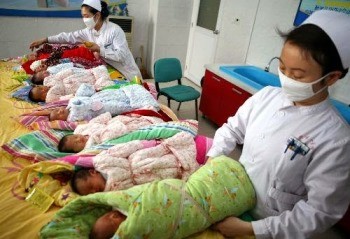A total of 1.45 million couples in China had applied for a birth certificate for a second child by the end of May 2015, with 1.39 million of them following the procedures, as announced by the National Health and Family Planning Commission (NHFPC) in a press conference in Beijing on July 10.
Yang Wenzhuang, director of the family planning grassroots guidance department under the NHFPC, said that about 11 million couples nationwide have qualified for a second child, with nearly 70 percent of them born after 1980.
According to data by the end of May 2015, the number of couples applying for a second child birth certificate in Hebei, Liaoning, Hubei, Shandong, Zhejiang, and Sichuan Provinces and Chongqing Municipality accounted for 55.2 percent of the total figure.
Statistics from the NHFPC also showed that China had 16.8 million new births last year, 470,000 greater than 2013, which have been attributed to the easing of the policy.
On Nov. 15, 2013, China decided to loosen its decades-old population regulation and announced the new policy at the third plenary session of the 18th Central Committee of the Communist Party of China, allowing Chinese parents to have a second baby if either parent is an only child.
China's family planning policy was introduced in the late 1970s to curb population growth by limiting most urban couples to have only one child. The policy poses a great challenge to China, which is now facing issues about its rapidly ageing population, labor shortages and gender imbalance.
But since the late 1990s, the policy has gradually been relaxed.
The old policies have helped to control population growth in China, which has been dramatically reduced in the past three decades, but it brought with them problems such as an increase in the average age and low fertility rates.
Based on government data, the number of elderly people (aged 60 or above) in China reached 202 million in 2013, which accounted for 14.9 percent of the total population. Population authorities said that the figure is expected to rise to 38 percent by 2050.
The total fertility rate in China also dropped to less than 1.5, below most other countries, the report added.




























